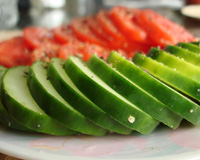
Rutgers Today talked to Donald W. Schaffner, the director of the Center for Advanced Food Technology at Rutgers, about the deadly outbreak and asked him what steps individuals as well as the government should take to protect those consuming food in the United States and abroad.
Rutgers Today: How concerned should people consuming food in the United States be about this widespread outbreak of E. coli?
Schaffner: People consuming fresh produce in the United States do not need to be concerned about being part of this outbreak. While the definitive source of the outbreak is not known yet (Cucumbers from Spain were originally implicated, but the source now seems to be German sprouts), it seems very unlikely that any of the contaminated produce has made it to the U.S. Most of our fresh produce is grown here, in Mexico, or in South America.

Schaffner: Chinese scientists who have analyzed samples of the German strain are being quoted as calling this bacterium a new "super-toxic" E. coli strain because it contains genes from another closely related strain of E. coli. The national Centers for Disease Control and Prevention (CDC) has gone on record as stating that the strain has been seen before, although it is very rare and has never been reported in the U.S..
It is important to realize that bacteria naturally share genetic material all the time but most of the time it has no effect on public health. However, if the right genes get shared at the right time they can make the resulting strain more likely to cause illness, or more difficult to treat.
Rutgers Today: The two reported U.S. cases have been in people who have traveled to German recently. How do people traveling abroad this summer protect themselves?
Schaffner: While we may continue to learn about more cases associated with this outbreak, it is likely that the outbreak is over, and no new cases are occurring. German health authorities, however, are still recommending that people in Northern Germany avoid eating raw tomatoes, cucumbers, sprouts and salads until further notice.
People traveling abroad don't need to take any special precautions other than to check the CDC travel notices. Whether traveling or not this summer, common sense should prevail: Pre-made salads and cut fruits and vegetables should be properly refrigerated (40 F or 4 C); Don't eat wilted or damaged looking lettuce or other produce items; Realize that sprouts may be risky if made from contaminated raw material and most important, speak up and ask questions at a restaurant if you have concerns or something doesn't seem right.
Rutgers Today: What needs to be done to protect people consuming food in the U.S.? Can people assume that the vegetables they are purchasing at their local food stores are safe to eat?
Schaffner: People consuming foods in the United States are already protected by federal, state, and local public health regulations. A law signed earlier this year by President Obama also improved fresh produce food safety. The Food Safety Modernization Act strengthens the Food and Drug Administration’s ability to establish minimum standards for production and harvesting of fruits and vegetables.
While there is no way to guarantee the safety of any food, consumers concerned about fresh produce safety should ask the produce manager at their local store what steps the store, or chain of stores, are doing to ensure food safety. Meanwhile, farmers, scientists, and researchers at Rutgers and other universities worldwide, are continuing their investigation into the causes of and solutions to food poisoning from fresh produce.
– Robin Lally
Media Contact: Robin Lally
732-932-7084 ext. 652
E-mail: rlally@ur.rutgers.edu